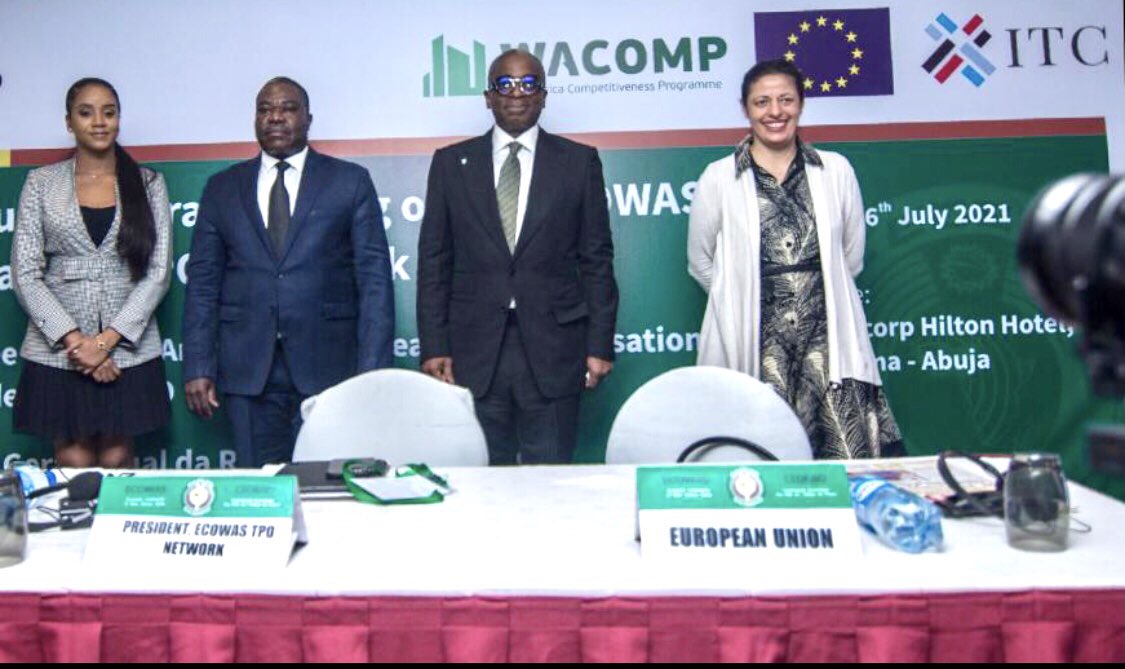|
Getting your Trinity Audio player ready...
|
The Economic Community of West African States (ECOWAS), with the support of the International Trade Centre (ITC), officially launched the ECOWAS Trade Promotion Organizations (TPO) Network and held its First Annual General Assembly 15th – 16th July 2021 in Abuja, Nigeria.
The ECOWAS Trade Promotion Organisation (TPO) Network is a public-sector led entity and will work in partnership with the ECOWAS commission to drive inclusive trade development initiatives within West Africa and beyond.
Before officially launching the Network, Mr. Tei Konzi, ECOWAS Commissioner for Trade, Customs and Free Movement, on behalf of the President of the ECOWAS Commission, H.E. Jean-Claude Kassi Brou, stressed the importance of the Trade Promotion Organisations in accessing new markets and establishing linkages between local and international businesses. These are some of the major reasons the Council of Ministers at their 17th June, 2021, 86th Ordinary session took a decision to establish the ECOWAS Trade Promotion Organisation Network in the region, he reiterated.
In her remarks, the International Trade Centre Executive Director Pamela Coke-Hamilton emphasized the milestone West Africa had achieved with the establishment of the ECOWAS TPO Network. ‘As a network, you can learn from each other, support growth into each other’s markets, invest in shared information assets, and amplify the voice of TPOs and the private sector as champions of the Africa of tomorrow,’ said Ms Coke-Hamilton.
Ms. Cicile Tassin-Pelzer, Head of Cooperation of the European Union Delegation to Nigeria and to ECOWAS, noted that the flagship of the West African Competitiveness Programme has brought together public and private sectors stakeholders across the region to strengthen competitiveness and enhance the level of production, transformation and export capacities of the Private Sectors. Speaking directly to the TPOs, by creating this network, you take your mission to another level, creating strength in numbers and synergies of closer collaboration with an ultimate objective of improving the West African Markets, she said.
Mr Olusegun Awolowo ED/CEO Nigeria Export Promotion Council, in his welcome address, stated that indeed this was the first of many steps towards building mutual trust and cooperation without borders within the ECOWAS region. As at today intra-Africa exports only accounts for about 16% of Africa’s global export, and more specifically intra-ECOWAS trade only accounts for a tenth of ECOWAS countries’ global trade. Indeed, more must be done to increase the volume of trade within the ECOWAS region and more importantly between ECOWAS and the rest of Africa.
It is therefore imperative that through the TPO network we work assiduously towards facilitating the ease of trade for our MSMEs within the ECOWAS region and Africa at large, thereby building an army of exporters that will boost intra Africa trade. If soundly operationalized, this new mechanism of TPO Network should help a great deal in boosting trade among ECOWAS member states. Consequently, economic integration in the sub-region will be further deepened, he added
The first AGM of the Network, chaired by the President of the ECOWAS TPO Network Mr Olusegun Awolowo, Chief Executive Officer/Executive Director of the Nigerian Export Promotion Council (NEPC) and supported by the Vice President Mr. Guy M’Bengue, Chief Executive Officer of Côte d’Ivoire Export Promotion Agency (APEX-CI), will consider key documents for the operationalization of the network.
As part of the event, the ECOWAS TPO network will also engage in discussions with Tony Elumelu, Chairman of Heirs Holdings, the United Bank for Africa, and Transcorp and Jean B. Bakole, Regional Director of UNIDO, moderated by Dr Asare Afua Asabea, Chief Executive Officer of Ghana Export Promotion Agency (GEPA).
About ITC – The International Trade Centre is the joint agency of the World Trade Organization and the United Nations. ITC assists small and medium-sized enterprises in developing and transition economies to become more competitive in global markets, thereby contributing to sustainable economic development within the frameworks of the Aid-for-Trade agenda and the United Nations’ Sustainable Development Goals.






